 Waking up to Walking
Waking up to Walking
North Smithfield students participate in International Walk to School Day by walking to the Halliwell Memorial School in Slatersville on October 4, 2006.
Percentage of children ages 5-18 who walked or biked to school*
*Source: U.S. Centers for Disease Control & Prevention, Kids Walk to School: Then and Now, 1/2006.
|
|


'Power of Place Summit'
Resource Column
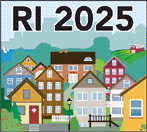
Held May 12, 2006
See
who participated(use 'smart'
as the password)
Click here for Summit website
Complete Survey Results
Grow Smart Board of
Directors
Deming E. Sherman
Chairman of the Board
Susan Arnold
William Baldwin
Joseph Caffey
Robert L. Carothers
Arnold Chace
Jen Cookke
Trudy Coxe
Stephen J. Farrell
Thomas E. Freeman
J. Joseph Garrahy
John R. Gowell, Jr.
Michael S. Hudner
Stanley J. Kanter
Howard M. Kilguss
Dennis Langley
James Leach
Roger Mandle
Rev. James C. Miller
Thomas V. Moses
George Nee
B. Michael Rauh, Jr.
Michael F. Ryan
Gary Sasse
Richard Schartner
Merrill Sherman
Curt Spalding
James F. Twaddell
Ranne Warner
Sandra Whitehouse
Frederick C. Williamson
W. Edward Wood
Board Listing with
Affilliation
|
View e-brief archives and press releases

Visit CommunityConnectionRICalendar

Become an e-Brief Sponsor

Display at your city or town hall, local library or place of business

Want to join an expanding network of smart growth practitioners? Click the map for details
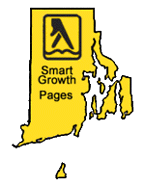 Smart Growth
Smart Growth
Grow Smart Staff
Scott Wolf Executive Director
Sheila Brush
Director of Programs
John Flaherty
Director of Research & Communications
Leslie Denomme
Executive Assistant for Finance
Dorothy Dauray
Office Assistant
Dee Dee Lozano
Training Coordinator
|
| |
Dear John,
You're among the 3,088 civic leaders,
state & local officials, development professionals,
journalists and visionary citizens getting the latest
news, happenings and trends in the smart growth
movement from Grow Smart
Rhode Island.
|
| |
| |
|
| The smart growth cause advanced on several fronts in Rhode Island election |
| |

Two ballot items that Grow Smart Rhode Island
backed passed overwhelmingly—a $50 million bond for
affordable housing production and an $88.5 million
bond for various transportation improvements
including commuter rail and replacement/ rehab of
our state’s public transit fleet.
The housing bond passed by roughly a 2 to
1 margin statewide - 66% to 34% - and won
approval from every Rhode Island municipality. In
addition, the town of Charlestown, RI
passed its own municipal housing bond. That
bond will provide $1 million to fund Charlestown's
affordable housing initiatives.
The statewide transportation bond
passed with backing from three quarters of the
electorate - 75% to 25%. Grow Smart also
opposed the proposed Harrah's Narragansett Indian
Casino in West Warwick on the grounds that its
development could impede the continued
revitalization of Providence and several other older
Rhode Island cities. The casino measure lost 63%
to 37%.
At the local level, municipal open space bonds
were passed in 8 communities by the following
margins:
- Bristol -69.6%
- Cumberland -77.5%
- Middletown - 71.9%
- North Kingstown (farmland) -54.7%
- North Smithfield -58.7%
- South Kingstown -80.4%
- Warwick-61%
- Westerly -64.8%
|
| |
|
| |
| Beauty, not brawn sells R.I. |
| |
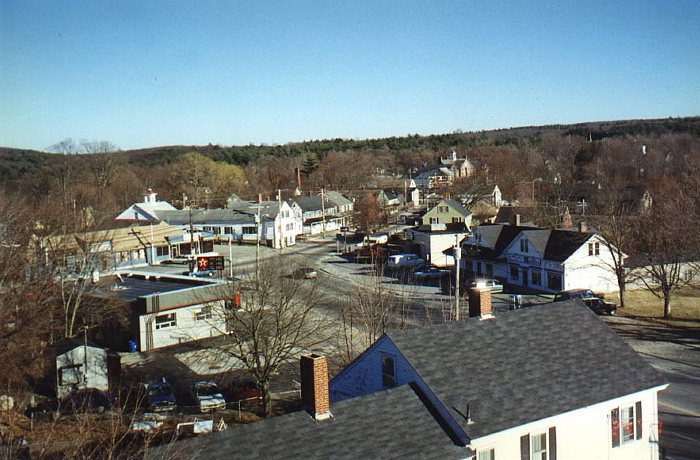
Excerpted from a Grow Smart RI Op/Ed
published in the Providence Journal, November 9, 2006
We heard a lot during this year's elections about
Rhode Island's liabilities, particularly our long history
of corruption. No one can deny that this is a
continuing and serious problem, and that addressing
it forthrightly is necessary for real economic and
social progress.
At Grow Smart Rhode Island, however, we believe
that any comprehensive, long-term action plan for
Rhode Island needs to analyze and capitalize on our
assets, as well as minimize our liabilities. For too long
we largely took for granted, and in too many cases
even squandered, our biggest assets: our distinctive
quality of place, reflected in our charming, historic,
and ethnically diverse neighborhoods, downtowns
and
village centers; our distinctive urban/rural balance;
our farm and forestland abutting our beautiful
coastline and inland waterways; and our
incomparable Narragansett Bay.
To tap Rhode Island's full potential, we
encouraged the state's political candidates to
embrace and prioritize an agenda of protecting and
enhancing our state's quality of place. This smart-
growth agenda called for well planned development
that safeguards open space and farmland, revitalizes
urban, town and village centers, keeps housing
affordable and expands economic opportunity and
transportation choices... Read
More
|
| |
|
| |
| Water for RI: Today and Tomorrow |
| |

This new publication, produced by members of the RI
Water Resources Board, the RI Department of
Environmental Management, the Environment Council
of RI and the Coalition for Water Security, is
designed to help state and local officials and citizen
planners make decisions for better managing the
availability and allocation of water for the future of
our state.
Clean, affordable water is critical to the health and
economic well-being of our state. Over the last
several decades, plans for commercial and residential
development have typically proceeded without
adequate consideration of the available water supply
in the area or the cumulative impacts of water
withdrawals from a common source.
Click HERE to access a
pdf version of the 24-page publication.
|
| |
|
| |
| Online resource for downtown research & development |
| |
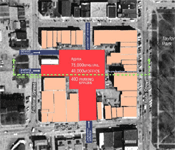
For more than 50 years, the
Downtown Research & Development Center has
provided a forum for exchanging news, information
and ideas on how to rebuild the hearts of our cities.
It offers a menu of newsletters, books and a broad
range of documents that have been discussed in
Downtown Idea Exchange, and Downtown Promotion
Reporter. Sample topics include:
|
| |
|
| |
| Cities experiment with rubber sidewalks |
| |
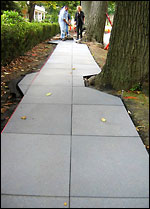
New technology is tree-friendly, less likely to need
maintenance and allows more rain to seep into the
ground, reducing runoff into storm sewers.
Baltimore, MD is one of about 60 U.S. cities testing
rubber sidewalks. The rubber comes in panels, similar
to floor tiles, each weighing about fifty pounds and
made from recycled tires. The experiment in
Baltimore is taking place along a block near the Inner
Harbor and in several neighborhoods.
Baltimore has more than 36 hundred miles of sidewalk
and currently spends about two million dollars a year
to repair cracks and uneven pavement.
Click here to view a short news clip
|
| |
|
| |
| CALENDAR Highlights |
| |

November 21, 29 & December 5, 2006 (5:30 -
9:30p)
Presented by the Grow
Smart RI Land-Use Planning Collaborative.
URI, Kingston
Thursday, November 30, 2006 (5:30 -
7:30p)
Presented by the RI
Economic Policy Council.
North Stonington, CT
Friday, December 1, 2006 (8:00 -
4:00p)
Presented by the
Commonwealth of Massachusetts and the MA
Chapter of the American Planning Association
DCU Center
Worcester, MA
Thursday, December 7, 2006 (4:30-
8:00p)
Training provided by:
RI Department of Environmental Management,
Narragansett Bay Nat’l Estuarine Research Reserve.
Coordinated by: Grow Smart RI Land-Use Training
Collaborative
DEM, Room 300
Providence
|
| |
|
| |
| 'Growth & Development' in the news |
| |

Send
us Your News
We want to know what's happening in your
community.
National
New England
Statewide
Bristol
Burrillville
Central Falls
Coventry
Cumberland
Foster
Glocester
Lincoln
Narragansett
Newport
Providence
Scituate
Smithfield
South Kingstown
Tiverton
Woonsocket
|
| |
|
| |
| Why not share this with a friend? |
| |

|
| |
|
| |
|